 1. Last week I was almost-but-not-quite finished reading Ruled Britannica by Harry Turtledove. I enjoyed this book for the following reasons: 1) Shakespeare quotations and references, as there were plenty of characters drawn straight from the plays; 2) Lope de Vega and how he was both a doppelganger and foil to Shakespeare; 3) the fictitious Shakespeare as an absentminded worrier and sometimes coward who was still able to write his plays; 4) the setting of a Spanish-occupied Britain that is ready to fight back; 5) the details of the setting, like who can speak Spanish and how well or badly, whether someone reflexively makes the sign of the cross or not, the supporting characters of clowns and witches, and all the beautifully described scenes set in the theater.
1. Last week I was almost-but-not-quite finished reading Ruled Britannica by Harry Turtledove. I enjoyed this book for the following reasons: 1) Shakespeare quotations and references, as there were plenty of characters drawn straight from the plays; 2) Lope de Vega and how he was both a doppelganger and foil to Shakespeare; 3) the fictitious Shakespeare as an absentminded worrier and sometimes coward who was still able to write his plays; 4) the setting of a Spanish-occupied Britain that is ready to fight back; 5) the details of the setting, like who can speak Spanish and how well or badly, whether someone reflexively makes the sign of the cross or not, the supporting characters of clowns and witches, and all the beautifully described scenes set in the theater.
That said, I skimmed quite a bit of the middle of this book, which was about 600 pages long, which was about 25% too long, according to my longstanding and well-entrenched opinion about very long books. Multivolume series, yes. Giant single volume doorstoppers, no. On the other hand, Shakespeare as a reluctant double-agent effecting social change with his plays! So I’m happy I read this alternate history designed especially to appeal to Shakespeare geeks.
2. Then I read The Raven in the Foregate and The Rose Rent by Ellis Peters, which make books 12 and 13 of the Brother Cadfael series. In separate, terrible ways, both of them spoil the plot egregiously and unforgivably. See, the thing about Brother Cadfael is the books rarely open with a corpse and sometimes aren’t about a murder at all. So when the cover–the cover!–says, “Who killed ___ and left the body under the hacked rose tree?”–and then this doesn’t happen until about page 80 of 220? Righteous outrage. Evidently in addition to not reading the back of the books, I can no longer look at the front.
Nevertheless, I adore these books and particularly liked the character Judith from The Rose Rent, as well as enjoying the cast of familiar characters: of course the sheriff Hugh Beringar, and Sister Magdalen who is the nun version of Brother Cadfael in cleverness, and Abbot Radulfus who is no fool either. Someday I will write a long Ode to the Mystery Series, enumerating all the ways I love thee. But meanwhile, let it suffice to say I will be reading more of these in the near future.
 3. And I tossed into the mix April Lady by Georgette Heyer. In this one, the romantic protagonists are already married but estranged because even though they secretly married each other for love, they never told each other and believe they married each other for position, wealth, or beauty. And so Nell has to keep Cardross from finding out that she has debts because otherwise she will never be able to persuade him that she loves him and not his money.
3. And I tossed into the mix April Lady by Georgette Heyer. In this one, the romantic protagonists are already married but estranged because even though they secretly married each other for love, they never told each other and believe they married each other for position, wealth, or beauty. And so Nell has to keep Cardross from finding out that she has debts because otherwise she will never be able to persuade him that she loves him and not his money.
Meanwhile, they have to corral Cardross’s sister Lettie, who is set on ruining herself and their reputation through her headstrong determination to elope, and Nell’s brother Dysart, who is set on ruining himself and their reputation through his headstrong determination to gamble away a fortune he doesn’t have. In classic romantic comedy style, everything could be easily resolved by the concerned parties sitting down and telling each other the truth–but then it wouldn’t be hilarious.
4. And, hey, I also didn’t finish three other books. I stopped reading The Hazel Wood by Melissa Albert at 60% because super creepy fairy tale horror with cannibalism and someone’s throat getting cut. I stopped reading Machine Man by Max Barry at 50 pages because the protagonist who wanted to perfect himself by converting his body gradually into a machine just seemed like he had serious mental problems. I stopped reading The Bone Season by Samantha Shannon at 30% because I thought it was about clairvoyants trying to hide from the police in futuristic London, but it was actually about clairvoyants enslaved by aliens who fed on their auras while fighting beasts from the rift.
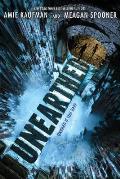 2. I borrowed Unearthed by Amie Kaufman and Meagan Spooner, the author duo who wrote the Starbound trilogy. This one has an Indiana Jones in space flavor: two unlikely allies, a scavenger and a linguistic genius, find themselves thrown together on an alien planet searching together for clues left behind by the Undying, an extinct alien race that sent a coded message to a resources-straitened Earth. There are tricks. There are traps. There are threats and secrets from without and within. And there are wheels within wheels. And everything is not as it seems.
2. I borrowed Unearthed by Amie Kaufman and Meagan Spooner, the author duo who wrote the Starbound trilogy. This one has an Indiana Jones in space flavor: two unlikely allies, a scavenger and a linguistic genius, find themselves thrown together on an alien planet searching together for clues left behind by the Undying, an extinct alien race that sent a coded message to a resources-straitened Earth. There are tricks. There are traps. There are threats and secrets from without and within. And there are wheels within wheels. And everything is not as it seems. 3. False Colors is a Georgette Heyer twin swap! What’s not to adore?
3. False Colors is a Georgette Heyer twin swap! What’s not to adore?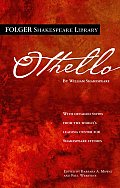 1. Othello by William Shakespeare is not a comedy. In fact, it’s so very much a tragedy that at the end, as you’d expect, nearly everyone winds up dead. I learned by reading the critical introduction (yes, I’m that kind of person) that Iago is the third wordiest character in the Shakespearean canon behind Prince Hamlet and Prince Hal.
1. Othello by William Shakespeare is not a comedy. In fact, it’s so very much a tragedy that at the end, as you’d expect, nearly everyone winds up dead. I learned by reading the critical introduction (yes, I’m that kind of person) that Iago is the third wordiest character in the Shakespearean canon behind Prince Hamlet and Prince Hal.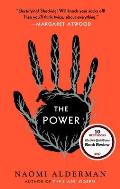 2. Then I read The Power by Naomi Alderman, which was pretty difficult and shocking (pun kinda intended). Suddenly women have the power to control electricity, especially young women. Suddenly women are more physically powerful than men, and this change breaks society. Breaks. It. Apart.
2. Then I read The Power by Naomi Alderman, which was pretty difficult and shocking (pun kinda intended). Suddenly women have the power to control electricity, especially young women. Suddenly women are more physically powerful than men, and this change breaks society. Breaks. It. Apart. 3. As it turns out, The Widows of Malabar Hill by Sujata Massey, the first in what I hope will be a series about the first female solicitor in Bombay in the 1920s, was a fitting follow-up to a tale of women breaking out of the social roles they scarcely realized caused them oppression. Perveen Mistry investigates the goings-on of three widows of the same Muslim man who all live in purdah, meaning as the only female solicitor in the city, Perveen is the only one who can speak to them face-to-face.
3. As it turns out, The Widows of Malabar Hill by Sujata Massey, the first in what I hope will be a series about the first female solicitor in Bombay in the 1920s, was a fitting follow-up to a tale of women breaking out of the social roles they scarcely realized caused them oppression. Perveen Mistry investigates the goings-on of three widows of the same Muslim man who all live in purdah, meaning as the only female solicitor in the city, Perveen is the only one who can speak to them face-to-face. 1. I love Brother Cadfael books ever so much, but I loved The Heretic’s Apprentice by Ellis Peters particularly because there was a book involved. The premise is that a faithful apprentice brings his deceased master to the abbey to be buried, but a question of heresy arises that might prevent the respectable pilgrim from being interred. Then the apprentice himself is denounced for heresy by a member of his former master’s household. Books and bookmaking and book-lore are important to this tale, and there’s a more than average amount of theology, too. Books, theology, and murder? Yes, please. But this is book 16! There are only four left!
1. I love Brother Cadfael books ever so much, but I loved The Heretic’s Apprentice by Ellis Peters particularly because there was a book involved. The premise is that a faithful apprentice brings his deceased master to the abbey to be buried, but a question of heresy arises that might prevent the respectable pilgrim from being interred. Then the apprentice himself is denounced for heresy by a member of his former master’s household. Books and bookmaking and book-lore are important to this tale, and there’s a more than average amount of theology, too. Books, theology, and murder? Yes, please. But this is book 16! There are only four left!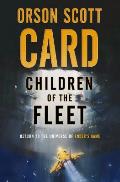 2. Then I read Children of the Fleet by Orson Scott Card because it was next on my to-read list, through which I am proceeding in a very roughly alphabetical order. It’s set after the Formic Wars are over, when the Battle School kids begin to return to Earth. Dabeet Ochoa is an eleven-year-old who is brilliant but arrogant and believes he belongs in Fleet School (which is Battle School reprised for colonization). Dabeet is and is not like Ender–comparisons between this story and that of Ender’s Game are numerous and part of the pleasure of the novel–but his evolution into a leader is rather different. My complaint about Card’s later books is that they read like Enderverse fanfiction, but this one draws close to the original in quality because it knows it’s similar in theme and setting.
2. Then I read Children of the Fleet by Orson Scott Card because it was next on my to-read list, through which I am proceeding in a very roughly alphabetical order. It’s set after the Formic Wars are over, when the Battle School kids begin to return to Earth. Dabeet Ochoa is an eleven-year-old who is brilliant but arrogant and believes he belongs in Fleet School (which is Battle School reprised for colonization). Dabeet is and is not like Ender–comparisons between this story and that of Ender’s Game are numerous and part of the pleasure of the novel–but his evolution into a leader is rather different. My complaint about Card’s later books is that they read like Enderverse fanfiction, but this one draws close to the original in quality because it knows it’s similar in theme and setting. 1. Frederica by Georgette Heyer, what can I say? This one had all my favorite tropes: a reluctant guardian, irrepressible schoolboys, a practical-but-harried “older” female (though 24 is by no means old), and an amusing bevy of suitors. It also had an irrepressible mutt and a dramatic scene with a hot air balloon, but it was mainly about two people who were so surprised to find real friendship that they are terrified to disrupt it with romance.
1. Frederica by Georgette Heyer, what can I say? This one had all my favorite tropes: a reluctant guardian, irrepressible schoolboys, a practical-but-harried “older” female (though 24 is by no means old), and an amusing bevy of suitors. It also had an irrepressible mutt and a dramatic scene with a hot air balloon, but it was mainly about two people who were so surprised to find real friendship that they are terrified to disrupt it with romance.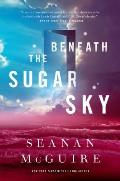 2. Though I was apprehensive about Beneath the Sugar Sky by Seanan McGuire, the third in the Wayward Children series about children who go through doorways to other realms–and then come back but want to leave again–it ended up ranking second overall in the series, outpacing book two by a significant margin. In this book, the characters go on a quest to a Nonsense world to reanimate a character who was murdered in book one by finding her bones, her spirit, and her nonsense so that she can still grow up and give birth to her daughter, who instigated the quest because she’s slowly disappearing.
2. Though I was apprehensive about Beneath the Sugar Sky by Seanan McGuire, the third in the Wayward Children series about children who go through doorways to other realms–and then come back but want to leave again–it ended up ranking second overall in the series, outpacing book two by a significant margin. In this book, the characters go on a quest to a Nonsense world to reanimate a character who was murdered in book one by finding her bones, her spirit, and her nonsense so that she can still grow up and give birth to her daughter, who instigated the quest because she’s slowly disappearing.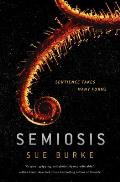 3. Semiosis by Sue Burke might be the best read of the year so far. It’s about colonists from Earth who settle on Pax and their growing realization that the plants might be intelligent. Each chapter is told from the perspective of a human character who belongs to a different generation (as well as from an unexpected narrator), and the evolution of the culture of the sentient beings on the planet makes for a fascinating narrative.
3. Semiosis by Sue Burke might be the best read of the year so far. It’s about colonists from Earth who settle on Pax and their growing realization that the plants might be intelligent. Each chapter is told from the perspective of a human character who belongs to a different generation (as well as from an unexpected narrator), and the evolution of the culture of the sentient beings on the planet makes for a fascinating narrative. 4. Then I read Circe by Madeline Miller, a gorgeously written story about the daughter of the sun god who becomes a witch and is fated to encounter Odysseus on his long journey home. It was mythic, it was emotional, it was clever, and its portrayal of gods and mortals was a delight. This is the very best of “literary fiction” because it tells an old story beautifully and makes sense of the strange and marvelous.
4. Then I read Circe by Madeline Miller, a gorgeously written story about the daughter of the sun god who becomes a witch and is fated to encounter Odysseus on his long journey home. It was mythic, it was emotional, it was clever, and its portrayal of gods and mortals was a delight. This is the very best of “literary fiction” because it tells an old story beautifully and makes sense of the strange and marvelous. 1. Twelfth Night by William Shakespeare was the last of the comedies on my Shakespeare Book Club
1. Twelfth Night by William Shakespeare was the last of the comedies on my Shakespeare Book Club 

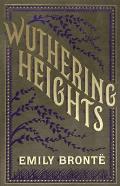 3. Now for the bad news. I tortured myself with Wuthering Heights by Emily Bronte, because it was a book I’d never read that I felt I ought to. Never again. Heathcliff was The Worst, and so was Catherine 1 and Catherine 2, and so were all their siblings and cousins, and especially so was Mrs. Housekeeper and Mr. Narrator. Or whatever their names were. Bring on the aliens made of gas bubbles riding in spaceships that are fish, bring on the whodunits set in the twelfth century, bring on the sword-and-sorcery tales of high adventure.
3. Now for the bad news. I tortured myself with Wuthering Heights by Emily Bronte, because it was a book I’d never read that I felt I ought to. Never again. Heathcliff was The Worst, and so was Catherine 1 and Catherine 2, and so were all their siblings and cousins, and especially so was Mrs. Housekeeper and Mr. Narrator. Or whatever their names were. Bring on the aliens made of gas bubbles riding in spaceships that are fish, bring on the whodunits set in the twelfth century, bring on the sword-and-sorcery tales of high adventure. 4. So I gobbled down another Brother Cadfael mystery to console myself. In this one (The Confession of Brother Haluin by Ellis Peters), Brother Haluin recovers from his deathbed, but his confession revealed a secret he had kept for nearly twenty years. Thus lightened, he is determined to put himself right in the eyes of God and men, so he makes a short pilgrimage, Brother Cadfael accompanying him. I have to say, I missed the townsfolk of Shrewsbury, particularly Hugh Beringar, but it was nevertheless a solid mystery in which the struggle to conceal a buried truth spirals out of hand. (Speaking of, the disembodied hand on the cover has literally nothing to do with the story.)
4. So I gobbled down another Brother Cadfael mystery to console myself. In this one (The Confession of Brother Haluin by Ellis Peters), Brother Haluin recovers from his deathbed, but his confession revealed a secret he had kept for nearly twenty years. Thus lightened, he is determined to put himself right in the eyes of God and men, so he makes a short pilgrimage, Brother Cadfael accompanying him. I have to say, I missed the townsfolk of Shrewsbury, particularly Hugh Beringar, but it was nevertheless a solid mystery in which the struggle to conceal a buried truth spirals out of hand. (Speaking of, the disembodied hand on the cover has literally nothing to do with the story.) 1. I hate to be like this. The two books I read this week were pretty good, but other books I’ve read did the same thing better. For example, Dark Eden by Chris Beckett was about the 532 descendants of Angela and Tommy, two people who were left by accident on an unpopulated planet. Since School was abandoned, the members of Family are about as smart as sixth-graders (which is to say, very bright cavemen), although superstitious and, ahem, inbred. Then along comes John Redlantern, a visionary who wants Family to cross Cold Dark (a range of mountains), because there isn’t quite enough food for Family where they live now. The hitch–How can Family leave Circle (the place of Landing Veekle’s original landing) when Earth will return to rescue them any day now?
1. I hate to be like this. The two books I read this week were pretty good, but other books I’ve read did the same thing better. For example, Dark Eden by Chris Beckett was about the 532 descendants of Angela and Tommy, two people who were left by accident on an unpopulated planet. Since School was abandoned, the members of Family are about as smart as sixth-graders (which is to say, very bright cavemen), although superstitious and, ahem, inbred. Then along comes John Redlantern, a visionary who wants Family to cross Cold Dark (a range of mountains), because there isn’t quite enough food for Family where they live now. The hitch–How can Family leave Circle (the place of Landing Veekle’s original landing) when Earth will return to rescue them any day now? 2. Likewise with The Girl Who Drank the Moon by Kelly Barnhill. It was a charming middle-grade reader about a town that leaves a baby every year for the Witch of the Forest. Except the Witch is kindly, and one baby she feeds moonlight, and then Luna is enmagicked. Of course, being magical is a problem until you’re old enough to control it. There’s also a swamp monster, a tiny dragon that thinks it’s enormous, and a young man who knows baby abandoning is wrong and wants to change things.
2. Likewise with The Girl Who Drank the Moon by Kelly Barnhill. It was a charming middle-grade reader about a town that leaves a baby every year for the Witch of the Forest. Except the Witch is kindly, and one baby she feeds moonlight, and then Luna is enmagicked. Of course, being magical is a problem until you’re old enough to control it. There’s also a swamp monster, a tiny dragon that thinks it’s enormous, and a young man who knows baby abandoning is wrong and wants to change things.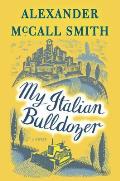 1. My Italian Bulldozer by Alexander McCall Smith is just like the film A Good Year, except in Italy instead of France, with food and wine in general instead of just wine, and a bulldozer instead of a tiny rental car. You already know this story (which is the whole point of reading it): A man suffering from vague dissatisfaction travels in order to find himself and finds someone else, too. The main character, a food writer, finds himself in possession of a rented bulldozer as his transportation. The whole book–indeed, the whole body of work by the author of the Precious Ramotswe series–is gentle. The self-revelations are gradual and inevitable, the situational comedy always mild and never cruel or mocking, and the epiphany at the end not very surprising.
1. My Italian Bulldozer by Alexander McCall Smith is just like the film A Good Year, except in Italy instead of France, with food and wine in general instead of just wine, and a bulldozer instead of a tiny rental car. You already know this story (which is the whole point of reading it): A man suffering from vague dissatisfaction travels in order to find himself and finds someone else, too. The main character, a food writer, finds himself in possession of a rented bulldozer as his transportation. The whole book–indeed, the whole body of work by the author of the Precious Ramotswe series–is gentle. The self-revelations are gradual and inevitable, the situational comedy always mild and never cruel or mocking, and the epiphany at the end not very surprising. 2. Having been curious about Binti by Nnedi Okorafor for a while, I endured a scavenger hunt at the library in order to find it (it wasn’t in the SF section or in the back room but on the new publications shelf even though it was no longer a new publication). Worth it. Binti is the only Himba ever to be invited to study at Oomza Uni, which poses enough cultural problems of its own. But when you add the Meduse, a warlike alien race, to the conflict, it will require great boldness–and mathematics–for Binti to survive her first journey off of her planet. Will she prove herself a harmonizer and bring peace to those who not only cannot agree but will not communicate? Easy to know why this novella won awards. I’ve already placed holds on the remaining two stories about Binti and hope there will be more.
2. Having been curious about Binti by Nnedi Okorafor for a while, I endured a scavenger hunt at the library in order to find it (it wasn’t in the SF section or in the back room but on the new publications shelf even though it was no longer a new publication). Worth it. Binti is the only Himba ever to be invited to study at Oomza Uni, which poses enough cultural problems of its own. But when you add the Meduse, a warlike alien race, to the conflict, it will require great boldness–and mathematics–for Binti to survive her first journey off of her planet. Will she prove herself a harmonizer and bring peace to those who not only cannot agree but will not communicate? Easy to know why this novella won awards. I’ve already placed holds on the remaining two stories about Binti and hope there will be more. 3. And then I read another mystery novel, Brother Cadfael #14: The Hermit of Eyton Forest by Ellis Peters. You’d think at this point Hugh, the sheriff and Cadfael’s friend, would lose his temper over all the things Cadfael knows and keeps to himself, but no, Hugh is the epitome of patience (because, truthfully, some things he does not want to know, because if he knew them, he would officially have to do something about them). This story features a murder, a duel, a kidnapping, a forced wedding, land sabotage, a runaway, and two legal disputes, not necessarily in that order. There is much traffic back and forth through Eyton Forest. Abbot Radulfus is particularly magnificent when he gets his steely ecclesiastical dignity on. And Cadfael knows more than almost everyone else at almost every point in the tale, so that pleases him.
3. And then I read another mystery novel, Brother Cadfael #14: The Hermit of Eyton Forest by Ellis Peters. You’d think at this point Hugh, the sheriff and Cadfael’s friend, would lose his temper over all the things Cadfael knows and keeps to himself, but no, Hugh is the epitome of patience (because, truthfully, some things he does not want to know, because if he knew them, he would officially have to do something about them). This story features a murder, a duel, a kidnapping, a forced wedding, land sabotage, a runaway, and two legal disputes, not necessarily in that order. There is much traffic back and forth through Eyton Forest. Abbot Radulfus is particularly magnificent when he gets his steely ecclesiastical dignity on. And Cadfael knows more than almost everyone else at almost every point in the tale, so that pleases him. 1. Last week I was almost-but-not-quite finished reading Ruled Britannica by Harry Turtledove. I enjoyed this book for the following reasons: 1) Shakespeare quotations and references, as there were plenty of characters drawn straight from the plays; 2) Lope de Vega and how he was both a doppelganger and foil to Shakespeare; 3) the fictitious Shakespeare as an absentminded worrier and sometimes coward who was still able to write his plays; 4) the setting of a Spanish-occupied Britain that is ready to fight back; 5) the details of the setting, like who can speak Spanish and how well or badly, whether someone reflexively makes the sign of the cross or not, the supporting characters of clowns and witches, and all the beautifully described scenes set in the theater.
1. Last week I was almost-but-not-quite finished reading Ruled Britannica by Harry Turtledove. I enjoyed this book for the following reasons: 1) Shakespeare quotations and references, as there were plenty of characters drawn straight from the plays; 2) Lope de Vega and how he was both a doppelganger and foil to Shakespeare; 3) the fictitious Shakespeare as an absentminded worrier and sometimes coward who was still able to write his plays; 4) the setting of a Spanish-occupied Britain that is ready to fight back; 5) the details of the setting, like who can speak Spanish and how well or badly, whether someone reflexively makes the sign of the cross or not, the supporting characters of clowns and witches, and all the beautifully described scenes set in the theater.

 3. And I tossed into the mix April Lady by Georgette Heyer. In this one, the romantic protagonists are already married but estranged because even though they secretly married each other for love, they never told each other and believe they married each other for position, wealth, or beauty. And so Nell has to keep Cardross from finding out that she has debts because otherwise she will never be able to persuade him that she loves him and not his money.
3. And I tossed into the mix April Lady by Georgette Heyer. In this one, the romantic protagonists are already married but estranged because even though they secretly married each other for love, they never told each other and believe they married each other for position, wealth, or beauty. And so Nell has to keep Cardross from finding out that she has debts because otherwise she will never be able to persuade him that she loves him and not his money.


 1. I was never wholly sure who the protagonist of All the Crooked Saints by Maggie Stiefvater was–certainly there were a couple of couples, and there were about five to eight characters who underwent internal transformations. The point of the book was facing your flaws or fears, and many characters did this, or tried to. About 100 pages in, I thought seriously about quitting because while the prose was as engaging as in any Stiefvater book (she excels at meaningful non sequiturs), it wasn’t clear what was really going on. The premise is that a family can cause miracles to happen to bring people healing and wholeness, but the miracle is two-staged, requiring the recipient (“pilgrim”) to come to some sort of acknowledgement or awareness to complete it. And the pilgrims have not been successful at finishing their miracles lately, and no one quite knows why.
1. I was never wholly sure who the protagonist of All the Crooked Saints by Maggie Stiefvater was–certainly there were a couple of couples, and there were about five to eight characters who underwent internal transformations. The point of the book was facing your flaws or fears, and many characters did this, or tried to. About 100 pages in, I thought seriously about quitting because while the prose was as engaging as in any Stiefvater book (she excels at meaningful non sequiturs), it wasn’t clear what was really going on. The premise is that a family can cause miracles to happen to bring people healing and wholeness, but the miracle is two-staged, requiring the recipient (“pilgrim”) to come to some sort of acknowledgement or awareness to complete it. And the pilgrims have not been successful at finishing their miracles lately, and no one quite knows why. 2. Venetia by Georgette Heyer can be summed up rather easily. Venetia is a 25-year-old woman accustomed to directing her own affairs. She falls in love with an unsuitable person, becomes persuaded not to pursue him, and then changes her mind and does as she pleases in the interests of her own happiness. Huzzah! Notable minor characters include her scholarly younger brother and the odious mother of her sister-in-law. I enjoyed it exactly as much as I’d planned to. Which was a lot.
2. Venetia by Georgette Heyer can be summed up rather easily. Venetia is a 25-year-old woman accustomed to directing her own affairs. She falls in love with an unsuitable person, becomes persuaded not to pursue him, and then changes her mind and does as she pleases in the interests of her own happiness. Huzzah! Notable minor characters include her scholarly younger brother and the odious mother of her sister-in-law. I enjoyed it exactly as much as I’d planned to. Which was a lot.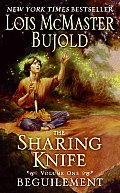 3. Directly upon the heels of Venetia, I borrowed Beguilement by Lois McMaster Bujold, an author I’ve never read or really had much interest in, because of a description on a Top 10 SFF Couples list on a
3. Directly upon the heels of Venetia, I borrowed Beguilement by Lois McMaster Bujold, an author I’ve never read or really had much interest in, because of a description on a Top 10 SFF Couples list on a  1. I tore through The Two of Swords, Volume Three by K. J. Parker. It was the end of an epic tale that was possibly… a romance? In the same way that The Engineer Trilogy wasn’t about the thing you thought it was about, The Two of Swords was, deep down, underneath all of the layers, turning on a gear that you couldn’t see from the outside of the machine.
1. I tore through The Two of Swords, Volume Three by K. J. Parker. It was the end of an epic tale that was possibly… a romance? In the same way that The Engineer Trilogy wasn’t about the thing you thought it was about, The Two of Swords was, deep down, underneath all of the layers, turning on a gear that you couldn’t see from the outside of the machine. 2. To continue my alternating fantasy and science fiction genres, I read Sand by Hugh Howey, which was described on Goodreads as Sand #1-5, which supported my impression that the story wasn’t over at the end of the book. Howey is a big proponent of self-publishing, so perhaps he meant to or did continue the tale elsewhere.
2. To continue my alternating fantasy and science fiction genres, I read Sand by Hugh Howey, which was described on Goodreads as Sand #1-5, which supported my impression that the story wasn’t over at the end of the book. Howey is a big proponent of self-publishing, so perhaps he meant to or did continue the tale elsewhere. 3. Then I tried to read The Grave’s a Fine and Private Place by Alan Bradley. I enjoyed the first Flavia de Luce novel. I enjoyed the second through fourth. I tolerated the fifth and sixth. I loathed the seventh, which attempted to be a breakout novel by displacing Flavia to Canada. I thought the eighth was a remedial attempt to fix the problems created by the seventh. And I could barely even read the ninth one because of how much I was rolling my eyes.
3. Then I tried to read The Grave’s a Fine and Private Place by Alan Bradley. I enjoyed the first Flavia de Luce novel. I enjoyed the second through fourth. I tolerated the fifth and sixth. I loathed the seventh, which attempted to be a breakout novel by displacing Flavia to Canada. I thought the eighth was a remedial attempt to fix the problems created by the seventh. And I could barely even read the ninth one because of how much I was rolling my eyes.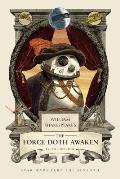 4. William Shakespeare’s The Force Doth Awaken by Ian Doescher is a Shakespearean rendition of The Force Awakens. It’s just about the most hilarious thing ever to exist. Chewbacca’s eghs and aaghs are translated by the editor in footnotes. BB-8’s nonsense lines are really skip code. There are even villain villanelles, among other amazing Easter eggs. Han Solo gets a moving soliloquy right before…the event in Act V. Everything Kylo Ren says sounds perfectly fitting in iambic pentameter. And the illustrations! For the small but fanatical set of people who love Shakespeare and Star Wars, this is a must-read. So. much. clever.
4. William Shakespeare’s The Force Doth Awaken by Ian Doescher is a Shakespearean rendition of The Force Awakens. It’s just about the most hilarious thing ever to exist. Chewbacca’s eghs and aaghs are translated by the editor in footnotes. BB-8’s nonsense lines are really skip code. There are even villain villanelles, among other amazing Easter eggs. Han Solo gets a moving soliloquy right before…the event in Act V. Everything Kylo Ren says sounds perfectly fitting in iambic pentameter. And the illustrations! For the small but fanatical set of people who love Shakespeare and Star Wars, this is a must-read. So. much. clever.